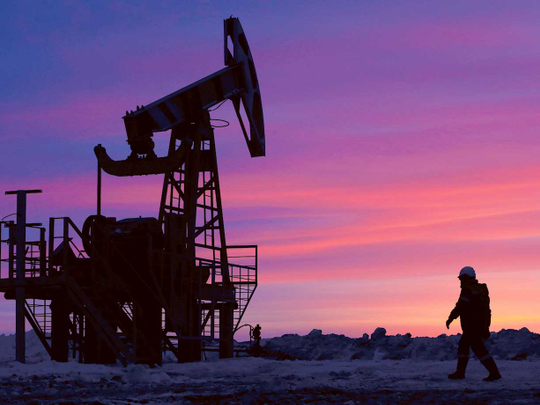
TOKYO: Oil prices rose on Monday after US Secretary of State Mike Pompeo said Washington will take all actions necessary to guarantee safe navigation in the Middle East, as tensions mounted following attacks on tankers last week.
Brent futures had climbed 14 cents to $62.15 (Dh228.2) a barrel by 0645 GMT after earlier rising about 0.4 per cent. They gained 1.1 per cent on Friday.
US West Texas Intermediate (WTI) crude futures were up 3 cents at $52.54 a barrel, giving up some of their earlier gains. They rose 0.4 per cent in the previous session.
Prices had jumped as much as 4.5 per cent on Thursday after the attacks on two oil tankers near Iran and the Strait of Hormuz.
It was the second time in a month tankers have been attacked in the world’s most important zone for oil supplies as tensions increase between the United States and Iran. Washington blamed Iran for Thursday’s attacks, prompting a denial and criticism from Tehran.
“We don’t want war. We’ve done what we can to deter this,” Pompeo said in an interview with Fox News Sunday, adding: “The Iranians should understand very clearly that we will continue to take actions that deter Iran from engaging in this kind of behaviour.”
Tensions between Iran and the United States have risen since US President Donald Trump pulled out of a deal last year between Iran and global powers that aimed to curb Tehran’s nuclear ambitions in exchange for sanctions relief.
Iran has repeatedly warned it would block the Strait of Hormuz if it cannot sell its oil because of US sanctions.
“Growing tensions in the Middle East remain a cause for concern as traders fear supply disruptions over an escalation towards militaristic conflicts,” said Benjamin Lu, an analyst at Phillip Futures in Singapore.
Also supporting prices were comments over the weekend by the Saudi energy minister, Khalid Al Falih, that Opec would probably meet in the first week of July and he hoped it would reach an agreement on extending oil output curbs.
“We are hoping that we will reach consensus to extend our agreement when we meet in two weeks time in Vienna,” Falih told reporters while attending a G20 energy and environment ministerial meeting in Karuizawa, northwest of Tokyo.
The Organization of the Petroleum Exporting Countries plus Russia and other producers, an alliance known as Opec+, have a deal to cut output by 1.2 million barrels per day (bpd) from January 1. The pact ends this month and the group meets in coming weeks to decide the next move.
US energy companies also cut the number of oil rigs operating for a second week in a row, with production growth expected to slow as crude prices fell to near their lowest levels of the year.












